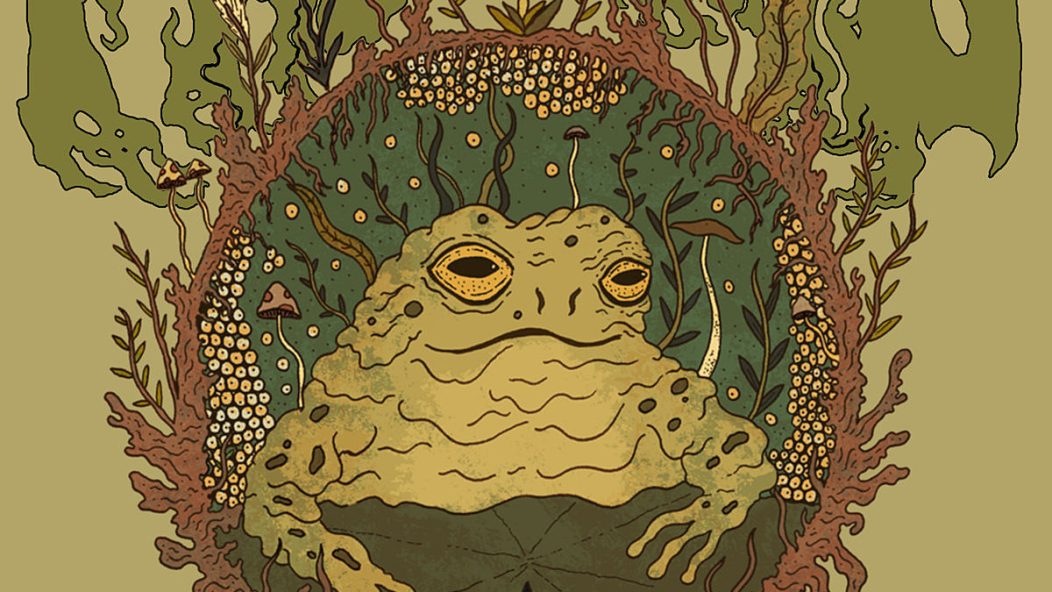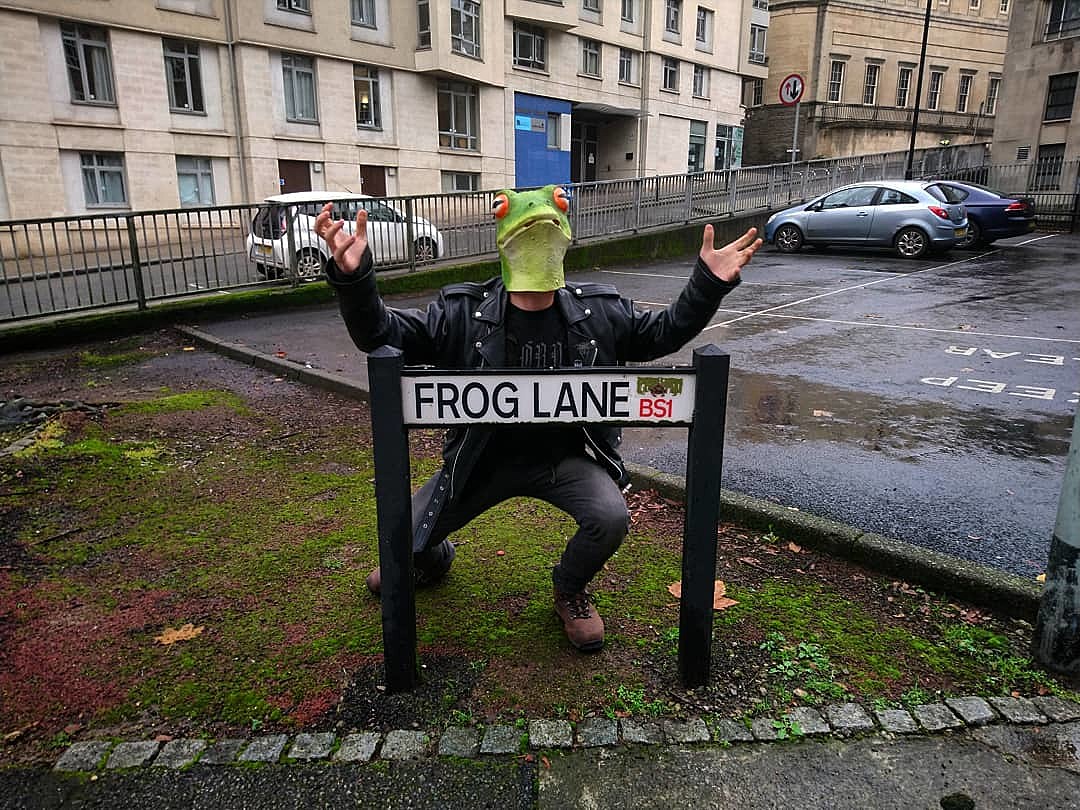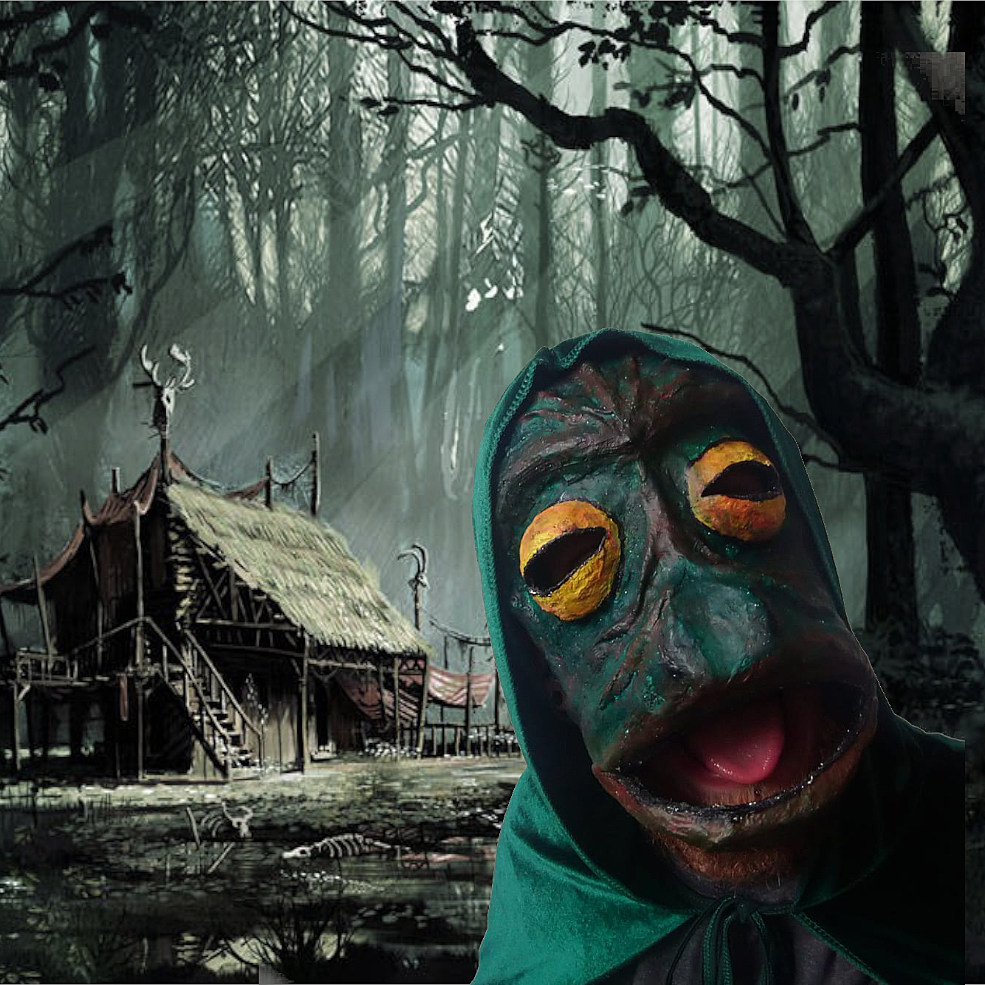
Piercing the Veil #1: Froglord Saves the Frogs, Melts Our Faces With Roiling Fuzz
Piercing the Veil is a new column that aims to dive deep into themed bands, exploring what makes their concepts more than just a gimmick.
For the entirety of our interview, Sage (the title he wished to be addressed by, drawn from his mythical order “Scholars of the College of the Swamp”), donned a rubber frog mask. It isn’t just for anonymity—he’s the sole member of Bristol, UK-based stoner metal project Froglord, fusing fuzzy feedback with an environmentalist edge to tell the story of the titular ancient frog deity. Sage recognizes the concept might be a deterrence, but beneath the rubbery amphibian eyes he’s an artist fueled by good humor and humanitarianism. This dedication is what Piercing the Veil, my new column, focuses on—uncovering where the mask and music intersect. (A week after our conversation Sage mentions that he’s acquired a new mask, “as a result of the discomfort of wearing that mask during the interview.”)
Sage recently dropped the Southern-rock tinged EP Save the Frogs, thematically in line with his three previous releases: the full-length Amphibian Ascending, the single Dungeon of the Froglord, and his debut The Froglord Cometh. Froglord blends stoner metal with a comical concept stemming from Sage’s obsession with budget monster movies. Burbling riffs and growling vocals chronicle the tale of the Froglord, a cosmic amphibian god. Once a millenium, the Froglord rises from the swamp to restore balance to the Earth, and Sage deciphers and delivers messages he receives from the Froglord through the amphibian aether. “He’s a manifestation of the earth and the natural balance of it,” Sage says. Alongside the high concept is an anchor in environmentalism. Save the Frogs is also a collaboration with SAVE THE FROGS!, a charity dedicated to protecting amphibian populations and promoting an environmentally-conscious society.
…
…
“During the first UK lockdown I had this phase of watching B-movie horror films from the 50s & 60s. They were natural horror films—films about giant frogs or mutant rabbits. The first EP was some hodgepodge I threw together in a week and a half because I had this concept of a Lovecraftian frog that rose from the swamp with X-ray vision.” This lighthearted origin compounded with Sage’s desire for a creative outlet other than his main project, a progressive black metal band attuned to spiritualism. “I wanted a break from that so I wrote about a big fucking frog. Now it’s become my main music project.”
As Froglord’s music evolves, so does the integration of Sage’s environmentalist background. He boasts a bachelor’s and a master’s degree in environmental science, has maintained a vegetarian diet for nearly half his life, and clocked innumerous volunteering hours. One of those volunteering experiences introduced him to SAVE THE FROGS! “I came across the charity when I was 17 and decided to do an event with them that year,” Sage says. “I’ve been drawn to SAVE THE FROGS! for a while but the connection between them and Froglord didn’t occur to me. At the back end of last year it clicked. I contacted the guy who runs the charity. He’s a musician too so we just went from there.”
The impending doom of Froglord reflects our own foreboding avenues given the severity of climate change. By some estimations, the planet has nine years remaining before we’ve damaged it beyond salvation. Frogs are not an arbitrary aquatic medium to convey this: they are fantastic bioindicators of their ecosystems because of their semi-permeable skin. When an amphibian population begins to decline in a specific system, it’s a sign that the environment is unstable. Frogs are, in their own way, Scholars of the College of the Swamp.
Froglord’s output characterizes this urgency. Sage recognizes the planet’s struggles with overpopulation and environmental destruction. He muses that “the pandemic could be nature’s way of evening the playing field. In a certain sense, Froglord is representative of the forces of the natural world.” However, Froglord could also personify Sage’s conflicting emotions: he’s radical in his vision but cautious regarding a correct course of action. Implementing solutions for issues this universal is thorny, and Sage grapples with navigating a path while justifying possible ramifications: “Froglord feels some guilt for wiping out the humans, but then he realizes the natural order of the world and deems it his prerogative to allow the world to fall back into a natural state of being. He strives for equilibrium.” Sage admits “there’s certain facets of my personal beliefs that have been adopted in the Froglord persona.”
…

…
Sage speaks optimistically when we return to his music. He’s already plotting the philosophical questions he—or rather the Froglord—will be asking concerning humanity’s role as products or producers of nature. In tandem with the existentialism, Sage aims to dive into the deep ponds of psychedelica as well as implement a broader palette of instruments. “On the last track of Save the Frogs I used some throat singing. I like the diversity of instruments,” Sage notes. His chronicles are equally ambitious. “The Froglore encases extensive tomes of knowledge I’ve yet to dive into yet,” he says. “I’ve got plans for three or four albums into the future. There’s so many things, mostly utterly ridiculous things, this concept could go run with.”
What began with B-movie inspiration and lockdown-enforced tedium evolved into a humanitarian effort. Though Sage reflects there was some snickering concerning the charitable collaboration due to the band’s nonsense, that goofiness soon turned into admiration as Save the Frogs raised over $1000 in under two weeks. It’s contingent with Sage’s personal beliefs of being conscientious of one’s actions; and, of course, his role as the human vessel of the Froglord is to “receive messages through the amphibian ether and present them through music.”
…

…
Sage routinely returns to the Froglord as a metaphor for natural balance. His thick, mid-tempo riffs trumpet the coming of an eon-old being as the planet’s pendulum. Were Sage not as lighthearted in his approach nor as dedicated to his cause Froglord’s gimmick could come off as preachy or flatly satirical. Thankfully, Sage focuses on sprouting legs through bubbling stoner sludgery: “I’m always thinking how I can infuse weird shit. I want to push some kind of boundaries. Froglord is not purely a vessel for music, it’s the concept and everything else around it.”
Froglord’s arc rests on its versatility, where the peculiarity of the concept is a buffer for its true intentions. Its campiness negates the potential haughtiness of Sage’s environmentalism, which, despite its importance, is often a hurdle. The division of art and ecocentric soapbox is one Froglord navigates by reveling in its high concept and by maintaining a lighthearted schema. As Sage indulges more of his off-kilter influences, it’s vital he remain masked—humanity may not be ready for its future as foretold by the amphibian ascension.
…
Save the Frogs released February 5th, 2021 via The Swamp Records.
For more information about SAVE THE FROGS!, check out their website to learn more and donate.










